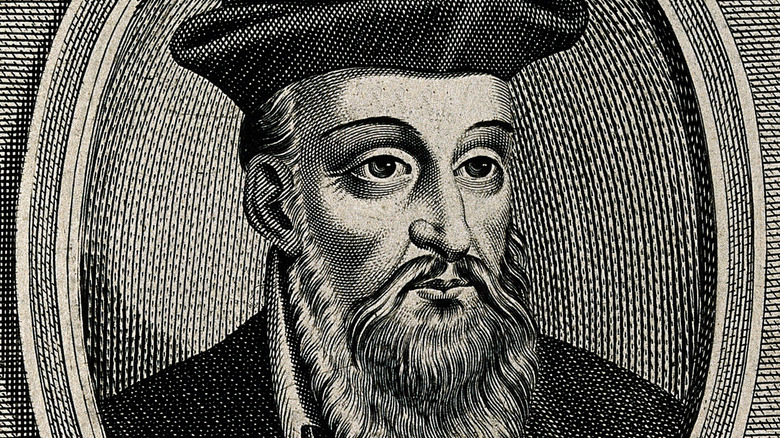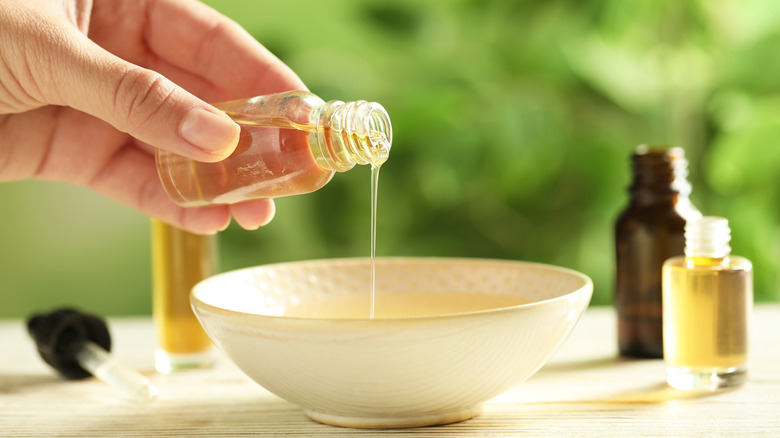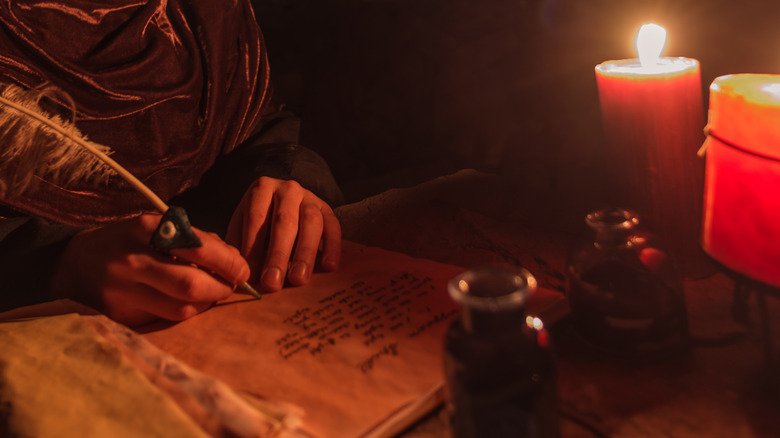Nostradamus Supposedly Harnessed His Psychic Abilities Using A Trippy Method
So we all know a bit about Nostradamus, right? 16th-century French prognosticator, funny black hat, lots of apocalyptic doom and all that? Thankfully, it seems like Nostradamus has a pretty low prophetic batting average. If he didn't, poetic verses like his extreme emo-metal, "Fathers and mothers dead of infinite sorrows / Women in mourning, the pestilent she-monster / The Great One to be no more, all the world to end" (via The New York Post) would have foretold the end of the world about a hundred times by now.
The truth is, there's no telling whether or not Nostradamus really believed any of his prophecies, or whether or not his visions happened at all. Reason being, Nostradamus started his second career in the mystical arts — a shift from the medical arts — after being on the run from inquisitors for several years for commenting about a church statue (via History). When his arcane dabblings caught the eye of Catherine de Medici, and he was appointed mystic to the court of King Henry II, he did his best to keep a low profile while engaging in very un-Christian methods of inquiry. Hence 1555's "The Prophecies," 942 quatrains (four-line poems) whose vagueness kept Nostradamus' low profile.
But how exactly did Nostradamus supposedly strive to receive his prophecies? Well, he took one part medical treatment — herbal remedies — mixed with one part magical tradition — scrying — and presto: instant, trance-like visions of perpetual doom.
Aroma therapy, darkly
Let's assume we've all seen one of those "crystal balls" that diaphanously veiled mediums with long fingernails wield in shows, movies, or perhaps near Jackson Square in New Orleans (a hotspot for psychics). That murky orb of mystery is a sensory focus that magic practitioners use to "scry:" simply look, stare, block out sounds, and let the mind wander, as Learn Religions explains. Other scrying options include fire, water, a mirror, or really anything that will induce a trance state. Ultra-black scrying mirrors are what you'd call one time-honored method. The British Library, for instance, has on display the black mirror of famed English magician, astrologer, and mathematician John Dee (1527 to 1608/9). The mirror itself dates back to the 1300s, and you can be sure that such traditions go way, way back before that.
Nostradamus didn't use a scrying mirror, though, or fire, a crystal ball, or even psychedelics like LSD or ayahuasca, for that matter. He went with water — herbal-infused water, in fact. When Nostradamus was a medical doctor, he devised homeopathic cures like vitamin C-rich, herbal lozenges made from rose petals (via History). It makes sense that he thought to incorporate some of his professional finds into his nightly vision quests. Nowadays, there's a massive holistic health market for scents, smells, incense, fragrant oils, etc. And to be fair, it's not too far of a leap to go from "use scents for meditative relaxation" to employing scents in a ritualistic way that involves deep focus.
Blood, madness, and horror reflected
You might be thinking that a placid aroma therapy session doesn't necessarily jive with visions of, "Rain, blood, milk, famine, steel, and plague," as The New York Post cites amongst Nostradamus' prophecies for 2021. Well, maybe Nostradamus had just had enough of running around Europe avoiding being imprisoned and tortured by the church. Did we also mention that before he started running in 1537, his wife and children died in 1534? As History says, they presumably died of plague, which makes Nostradamus' own medical practices involving "fresh, unpolluted air and water and clean bedding" all the more tragic (via the Jewish Virtual Library). Is it any wonder why Nostradamus' visions, if he indeed had them, were all blood, madness, and horror?
So what exactly did Nostradamus do when using his herbal water bowl to write "The Prophecies"? His own book might contain the answer, provided he engaged in some accurate self-reporting. The very first two quatrains of the book say, "Sitting alone at night in secret study / It is placed on the brass tripod / A slight flame comes out of the emptiness and / Makes successful that which should not be believed in vain / The wand in the hand is placed in the middle of the tripod's legs / With water he sprinkles both the hem of his garment and his foot / A voice, fear; he trembles in his robes / Divine splendor; the God sits nearby."


